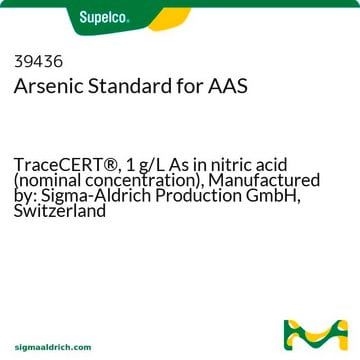43820
Dithizone
ACS reagent, for spectrophotometric det. of Cd, Cu, Hg, Pb, Zn, ≥98.0% (TLC)
Synonyme(s) :
Diphenylthiocarbazone
About This Item
Produits recommandés
Qualité
ACS reagent
for spectrophotometric det. of Cd, Cu, Hg, Pb, Zn
Niveau de qualité
Pureté
≥98.0% (TLC)
Forme
powder
Technique(s)
UV/Vis spectroscopy: suitable
Pf
168 °C (dec.) (lit.)
Chaîne SMILES
S=C(NNc1ccccc1)\N=N\c2ccccc2
InChI
1S/C13H12N4S/c18-13(16-14-11-7-3-1-4-8-11)17-15-12-9-5-2-6-10-12/h1-10,14H,(H,16,18)/b17-15+
Clé InChI
UOFGSWVZMUXXIY-BMRADRMJSA-N
Vous recherchez des produits similaires ? Visite Guide de comparaison des produits
Catégories apparentées
Description générale
Application
- Dithizone modified silver electrode for the determination of metal ions in aqueous solution: This study discusses a dithizone-modified electrode used for the electrochemical determination of various metal ions, highlighting its applications in environmental monitoring and industrial process control (Othman et al., 2016). Source.
- Eco-friendly immobilization of dithizone on coal bottom ash for the adsorption of lead (II) ion from water: This study explores the use of dithizone-immobilized coal ash for the efficient removal of lead from water, demonstrating a cost-effective method for treating contaminated water (Huda et al., 2021). Source.
- Colorimetric Sensing of Pb2+ Ion by Using Ag Nanoparticles in the Presence of Dithizone: The article details the development of a colorimetric sensor for lead ions, which uses silver nanoparticles and dithizone, providing a rapid and sensitive method to detect heavy metal contamination in environments (Roto et al., 2019). Source.
- Dithizone-etched CdTe nanoparticles-based fluorescence sensor for the off–on detection of cadmium ion in aqueous media: This research presents a fluorescent sensor based on dithizone-etched CdTe nanoparticles for detecting cadmium ions, offering applications in environmental monitoring and safety assessments (Li et al., 2017). Source.
Autres remarques
Mention d'avertissement
Warning
Mentions de danger
Conseils de prudence
Classification des risques
Eye Irrit. 2 - Skin Irrit. 2
Code de la classe de stockage
11 - Combustible Solids
Classe de danger pour l'eau (WGK)
WGK 3
Point d'éclair (°F)
Not applicable
Point d'éclair (°C)
Not applicable
Équipement de protection individuelle
dust mask type N95 (US), Eyeshields, Gloves
Choose from one of the most recent versions:
Déjà en possession de ce produit ?
Retrouvez la documentation relative aux produits que vous avez récemment achetés dans la Bibliothèque de documents.
Les clients ont également consulté
Notre équipe de scientifiques dispose d'une expérience dans tous les secteurs de la recherche, notamment en sciences de la vie, science des matériaux, synthèse chimique, chromatographie, analyse et dans de nombreux autres domaines..
Contacter notre Service technique












